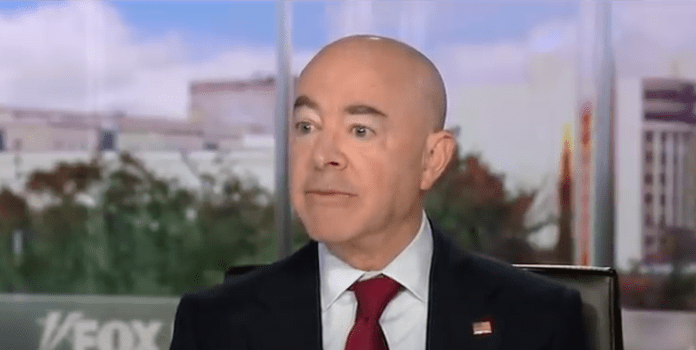() Despite a federal judge in Florida ruling more than once that the Biden administration parole program is illegal, the administration has expanded it and created another parole program to allow even more people into the U.S.
There have been multiple “parole” programs created by the Biden administration, which critics argue violate federal law. One created ahead of Title 42 ending expanded entry to citizens of four countries who were previously prevented entry or limited entry.
In May, 30,000 citizens each from Venezuela, Nicaragua, Cuba and Haiti, or 120,000 total, would be allowed in using the CBPOne App. After scheduling an appointment through the app, they arrive at a port of entry and are processed by Border Patrol agents with the expectation of being released into the U.S.
Texas Attorney General Ken Paxton sued to block the app’s use.
“The Biden Administration deliberately conceived of this phone app with the goal of illegally pre-approving more foreign aliens to enter the country and go where they please once they arrive,” he said.
President Joe Biden, Homeland Security Secretary Alejandro Mayorkas “and the entire Biden Administration have prioritized creating and protecting new ways for illegal aliens to stream into this country, no matter the cost or consequence to struggling American citizens,” Paxton added.
Under Mayorkas, the Department of Homeland Security expanded and created another parole program, a new family reunification parole process for citizens of Colombia, El Salvador, Guatemala and Honduras.
It facilitates “access to lawful pathways,” also opening regional processing centers for the first time in U.S. history outside of the United States.
The first processing centers, in Colombia and Guatemala, enable citizens there to make an appointment to meet with an immigration specialist to help them be processed before they ever arrive to the U.S.
“The new processes are for nationals from Colombia, El Salvador, Guatemala, and Honduras whose family members are U.S. citizens or lawful permanent residents and who have received approval to join their family in the United States,” DHS said in a statement. “Specifically, nationals of these countries can be considered for parole on a case-by-case basis for a period of up to three years while they wait to apply to become a lawful permanent resident.”
Mayorkas, who has been accused by critics of intentionally seeking avenues to advance an “open borders” policy that effectively undermines federal immigration law, continued to gaslight the public about his intentions.
“These new processes promote family unity and provide lawful pathways consistent with our laws and our values,” Mayorkas claimed in a statement. “The Department has proven that the expansion of safe, orderly, and lawful pathways, combined with strong enforcement, is effective in reducing dangerous, irregular migration to the United States.”
On May 31, DHS stopped using DNA testing to confirm people who claim to be family members are actually family members. Now, large groups of people are arriving at the border claiming to be family members and Border Patrol agents have no way to disprove their claims, a Border Patrol agent tasked with processing them told The Center Square.
Certain citizens of Colombia, El Salvador, Guatemala, and Honduras “who are beneficiaries of an approved Form I-130, Petition for Alien Relative may be eligible to be considered for parole under the new processes,” DHS said.
“The processes begin with the Department of State issuing an invitation to the petitioning U.S. citizen or lawful permanent resident family member whose Form I-130 on behalf of a Colombian, Salvadoran, Guatemalan, or Honduran beneficiary has been approved,” it continued. “Beneficiaries awaiting an immigrant visa could include certain children and siblings of U.S. citizens and certain spouses and children of permanent residents,” meaning possibly millions more will be allowed into the U.S.
Those invited through the program “can then initiate the process by filing a request on behalf of the beneficiary and eligible family members to be considered for advance travel authorization and parole.”
DHS claimed the new parole process is “only on a discretionary, case-by-case, and temporary basis upon a demonstration of urgent humanitarian reasons or significant public benefit, as well as a demonstration that the beneficiary warrants a favorable exercise of discretion.”
Parole lasts for up to three years and those being paroled are eligible to request employment authorization while they wait for their visa to be approved. After their visa is approved, “they may apply to become a lawful permanent resident.”
Mayorkas argued the Immigration and Nationality Act authorizes him, “in his discretion, to parole noncitizens into the United States temporarily on a case-by-case basis for urgent humanitarian reasons or significant public benefit.”
Information about the process was published in Federal Register Notices for Colombia, El Salvador, Guatemala, and Honduras.

